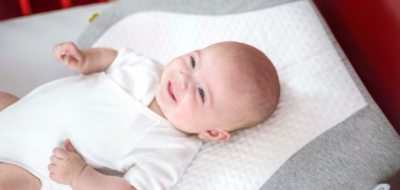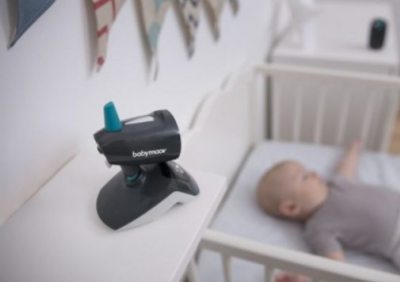As babies spend so much time lying down, their heads can sometimes become flattened on one side. As new parents, we all share the same fear... To one day see that little flat spot appearing on the skull of our little one. But hey, good news! There is a way to preserve the perfect well-rounded skull of our angel: The Lovenest and Lovenest + positioner.
Created by Dr Maidenberg, this innovative baby head rest is specially designed to prevent plagiocephaly syndrome! But who is this Dr? We thought you would be keen to get to know him better, so our communication officer Celine went to meet him and ask all the questions we had in mind.
The Interview
Dr Maidenberg, tell us a little bit about yourself?
Dr Maindenberg: "Hello. I have been in the wonderful profession of paediatrician for 25 years in private practice. I've also worked in maternity and as a hospital attaché. Like many of my colleagues, I've done humanitarian and development missions with various associations. It's a diverse and rewarding career in human terms.
I have a highly developed environmental awareness, which translates into my practice in terms of economy of prescriptions, dialogue-first and health education. Carefully observing social relations, particularly parent-child relations, and the characteristics of habits and the immediate environment is also a very ancient recommendation by Hippocrates himself! I'm president of Association Respirer (The Breathing Association - a sentinel network of paediatricians involved in research on the respiratory environment).
Apart from my job, I have several passions: my children of course (I have two who are grown-up now: 27 and 18). History and Literature ...And I'm greatly involved in sustainable development. I just got permission from the municipality of Paris to garden in front of my office (I invite you to also apply for a license to grow vegetables...!) So, I'm getting started on some gardening."
What prompted you to design the Lovenest?
Dr Maindenberg: "Clinical paediatrics increases the propensity of doctors to observation. That's why I think that city paediatricians are good clinicians and also "good discoverers"! In 1994, the implementation of recommendations for babies sleeping on their backs reduced Sudden Infant Death syndrome. In the weeks that followed the spread of this new sleeping position, in my consultations I saw more and more babies with cranial asymmetry: postural plagiocephaly.
At first, I conducted some literature-based research and I read all the studies on the subject. The "It's only aesthetic, it will go away by itself" from some of my colleagues didn't stop me; even more so because it was established that in some cases this flattening could cause complications over time. Moreover, we began to operate on the most pronounced cases in Neurosurgery.
I was sure a simple and effective preventative measure could be found, and I worked on it with Gina Diwan, a kid's clothing designer. And so the baby head positioner Lovenest and Lovenest + were born, products designed to prevent this condition. It was Gina who gave it the heart shape that's so special!"
What is the principle of Lovenest and what are its benefits for babies?
Dr Maindenberg: "It's recommended that babies should sleep on their backs, but they need to avoid being in this position constantly as it can augment the flattening phenomenon. Thus it's important to have play sessions on their stomachs during waking periods, making skin to skin contact with your newborn, carrying them around... This varies the positions of the child.
Like all of these good practices, the baby head positioner Lovenest and Lovenest + are complementary preventives against plagiocephaly. The head-support was designed with a specific inclination which respects the shape of the infant's skull (which is much more elongated than that of an adult) and provides real support without impeding freedom of movement. Furthermore, its "holding" effect (a reassuring cocoon) reassures and soothes the baby, like in their mother's womb. It can be used right from birth.
It's important to note that if the development of plagiocephaly is avoided during the first three months of an infant's life, there is no further risk of future deformation. So, everything happens from the first day of a baby's life.
Celine: Why did you choose to work with Babymoov?
Dr Maindenberg: "I was attracted by the dynamism of the company, the openness of its teams and managers for developing innovative ideas. As for me, their priority was to create the best product for the proper development and well-being of babies, while supporting and reassuring parents.
They really listened and allowed Lovenest to become a benchmark product for many parents. Today it's even recommended today by my colleagues, as I read recently in the professional journal Medicine and Children."




Leave a comment
This site is protected by hCaptcha and the hCaptcha Privacy Policy and Terms of Service apply.